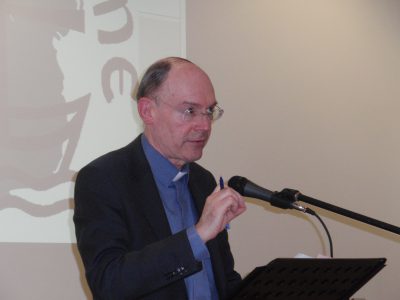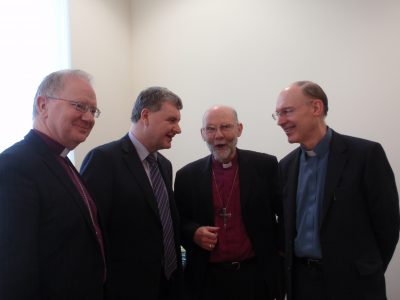In the light of the creation narratives, we must recognise that the earth is a part of God’s creation, and therefore that the earth is a sacred reality requiring reverence. There is a unique affinity and kinship between the Spirit of God suffusing nature, and the Spirit of God poured out on the whole of humanity at the dawn of time.
That is the view of Dr Dermot Lane, President of the Mater Dei Institute of Education, who was respondent speaker at the Irish Council of Churches AGM on 25th March. The main speaker was Bishop David Atkinson (see previous news item).
Lane said he was “very pleased” to have read Atkinson’s book, Renewing the Face of the Earth, and that he would “warmly recommend” it. “It is a comprehensive treatment of the issues, being in many respects an inter-disciplinary approach, bringing science and scripture, theology and liturgy, into a unique dialogue in the service of sustainable development and a safer environment,” he said.
 According to Lane, a number of steps must be taken if the planet is to be safeguarded for the next generation: “We must, first and foremost, move from dwelling in a disenchanted universe to a recovery of a re-enchanted world. That move must be informed by a Theology of Creation, grounded in Covenant as outlined by David [Atkinson], and complemented by a Pneumatology of Creation and humanity on the one hand, and a philosophical recovery, on the other hand, of the unity of spirit and matter that takes account of the theological implications of Incarnation and Resurrection …. The Bible is rich in imagery of God as Spirit who sustains and renews all forms of life on the planet, beginning with the book of Genesis and culminating in the second outpouring of the Spirit at the Pentecostal event after Easter.”
According to Lane, a number of steps must be taken if the planet is to be safeguarded for the next generation: “We must, first and foremost, move from dwelling in a disenchanted universe to a recovery of a re-enchanted world. That move must be informed by a Theology of Creation, grounded in Covenant as outlined by David [Atkinson], and complemented by a Pneumatology of Creation and humanity on the one hand, and a philosophical recovery, on the other hand, of the unity of spirit and matter that takes account of the theological implications of Incarnation and Resurrection …. The Bible is rich in imagery of God as Spirit who sustains and renews all forms of life on the planet, beginning with the book of Genesis and culminating in the second outpouring of the Spirit at the Pentecostal event after Easter.”Lane said that we must begin to reintegrate spirit in matter and matter in spirit. “It is this split between spirit and matter that is largely responsible for the removal of the Spirit from nature and the life of the individual,” he said. “Because of this separation of spirit and matter, we have divorced the Spirit of God from the materiality of creation and the corporeality of human beings – as if the Spirit of God was somehow active outside of creation and above human beings.”
He said that if we didn’t recover “this unity of spirit and matter” then it would be difficult to move from a disenchanted universe to the recovery of an enchanted world, and that it would be equally difficult to respect the integrity of creation and assume responsibility for the care of the earth.
He said he wished to go back to the scriptures to add a pneumatological dimension to Atkinson’s theology of God’s covenant with creation. “An increasing number of biblical commentators are now pointing out that there is an intimate link between creation and the Spirit of God – so much so that they talk about the action of the Creator Spirit within creation.”
He spoke about the shift over half a millennium from a widespread belief in God to a new situation in which unbelief had become the default position. This gradual shift had been described by Charles Taylor (in his book, A Secular Age) as a shift from an enchanted universe to a “disenchanted world”.
“This disenchantment of the universe has had an impact on our understanding of the cosmos, our understanding of the individual, and our understanding of society. We have moved from an enchanted world, containing elements of magic, meaning and mystery to a disenchanted world that has come under the control of scientific explanation and objective, disengaged reason …. The cosmos has become a vast, impersonal order …. We have moved ‘from a fixed cosmos to a vast evolving universe’.”
of the cosmos, our understanding of the individual, and our understanding of society. We have moved from an enchanted world, containing elements of magic, meaning and mystery to a disenchanted world that has come under the control of scientific explanation and objective, disengaged reason …. The cosmos has become a vast, impersonal order …. We have moved ‘from a fixed cosmos to a vast evolving universe’.”
 of the cosmos, our understanding of the individual, and our understanding of society. We have moved from an enchanted world, containing elements of magic, meaning and mystery to a disenchanted world that has come under the control of scientific explanation and objective, disengaged reason …. The cosmos has become a vast, impersonal order …. We have moved ‘from a fixed cosmos to a vast evolving universe’.”
of the cosmos, our understanding of the individual, and our understanding of society. We have moved from an enchanted world, containing elements of magic, meaning and mystery to a disenchanted world that has come under the control of scientific explanation and objective, disengaged reason …. The cosmos has become a vast, impersonal order …. We have moved ‘from a fixed cosmos to a vast evolving universe’.”Lane said that it was against “this new, modern social imaginary” that we must seek to reconstruct a new theology of Creation, as Atkinson had done, and suggested that within that theology of Creation the need for the introduction of the presence of the Spirit of God and a new understanding of what it meant to be human.
He noted that the story of Creation began with the breath of God (ruah), or the Spirit of God, and not with the Word of God. “The breath of God precedes the speaking Word of God, that is to say the presence of the Spirit is pre-supposed by the Word of God. It is in the context of the blowing of the breath of God that God’s Word is spoken. Before we can say ‘God said’ we must recognise that the Spirit of God was breathing or hovering or hatching over the world.”
In emphasising the primacy of the Spirit within the Creation stories, Lane said he did not intend in any way to subordinate the Word to the Spirit. “Rather, we are attempting to take seriously the sequence of the story of Creation as given in Genesis – which is one of Spirit and Word working together.”
He also noted that there was a fundamental difference between God and the world, a certain separateness of the Spirit from the world, and yet at the same time there was an underlying intimacy between the Spirit and Creation.
